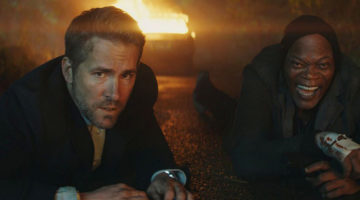Review: The Book Thief
Synopsis:
With Europe on the brink of war, a young girl who is sent to Germany to live safely with adoptive parents. While confronting the realities of war and nature of death, this optimistic girl fosters a series of unlikely friendships, and develops a love of reading and writing.
Cast:
Geoffrey Rush is Hans, the warm and welcome stepfather of young Liesel, portrayed brilliantly by young Sophie Nélisse.
Review:
A serviceable piece of middlebrow filmmaking, The Books Thief is a lengthy allegorical tale infused with idealism and enthusiasm amid the horrors of war and atrocities. It’s in fact less the words and more the winning spirit of the two disparate leads that keep this relatively light drama afloat.
Based on the 2006 book of the same name by Australiam author Makus Zusak, The Books Thief follows the life of young Liesel, a precocious and initially illiterate blond girl sent away from her mother to live with foster parents in Germany in the spring of 1938. Played with conviction by newcomer Sophie Nélisse, Liesel copes with both her mother’s absence and her younger brother’s sudden death, whom while taking the journey succumbed to, well, life.
That is more or less how it is put by the narrator, a voice who doesn’t directly introduce himself but demonstrates that he in fact Death. He is initially fascinated by Liesel, who he first encounters on the train and stresses that they will meet again. Everyone dies, after all.
Perhaps knowing that Death, voiced without maliciousness but instead a dutiful pride, is coming for many of the characters in the film lessens the dark nature of the story. The dangers eventually mount around Liesel, but initially they are simple: peer bullying, a relentless curious boy, and a cold-hearted, snarky witch of a step mother.
She means well, sort of, and while she presents a terrible vision of a mother, it’s the stepfather Hans (Geoffrey Rush), who charms and befriends Liesel almost instantly. He’s earnest face, playful nature, and genuine
Hans teaches Liesel how to read, while the blond-haired and blue-eyed Rudy, Liesel’s classmate and neighbor, continues to court the woman. The two kids have some especially strange conversations for their age, and Rudy himself gets into one or two ludicrous situations which strain credulity. There are a few more moments like that in a film that is meant to tug at heartstrings and stir hope.
Liesel’s ever-growing love of books and her introduction with a powerful woman whose house contains beautiful library is certainly a storyline meant to inspire, as is Liesel’s relationship with Max, young Jewish man who comes to hide in the basement.
Sure, there are moments of fear and tension, but the soft edges of The Book Thief prevail throughout. Basements are checked, war is declared on Germany, and families start to fracture, and the lengthy film carries on across nearly a decade with a bright yet realistic outlook.
Should You See It?
A pair of remarkable performances anchor this adequate adaptation so if you’re looking to be inspired and only slightly challenged, this will work.
[star v=3]







